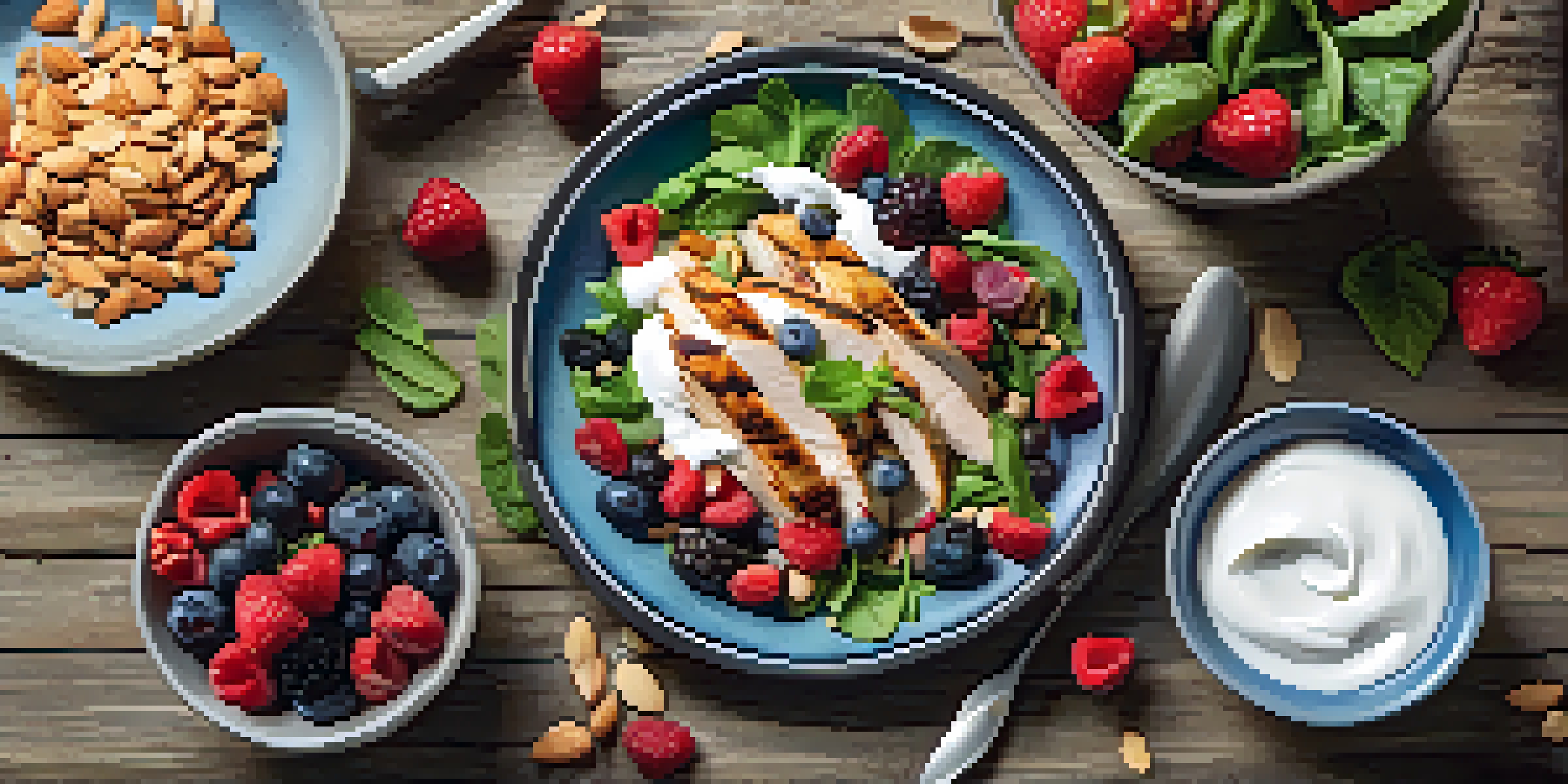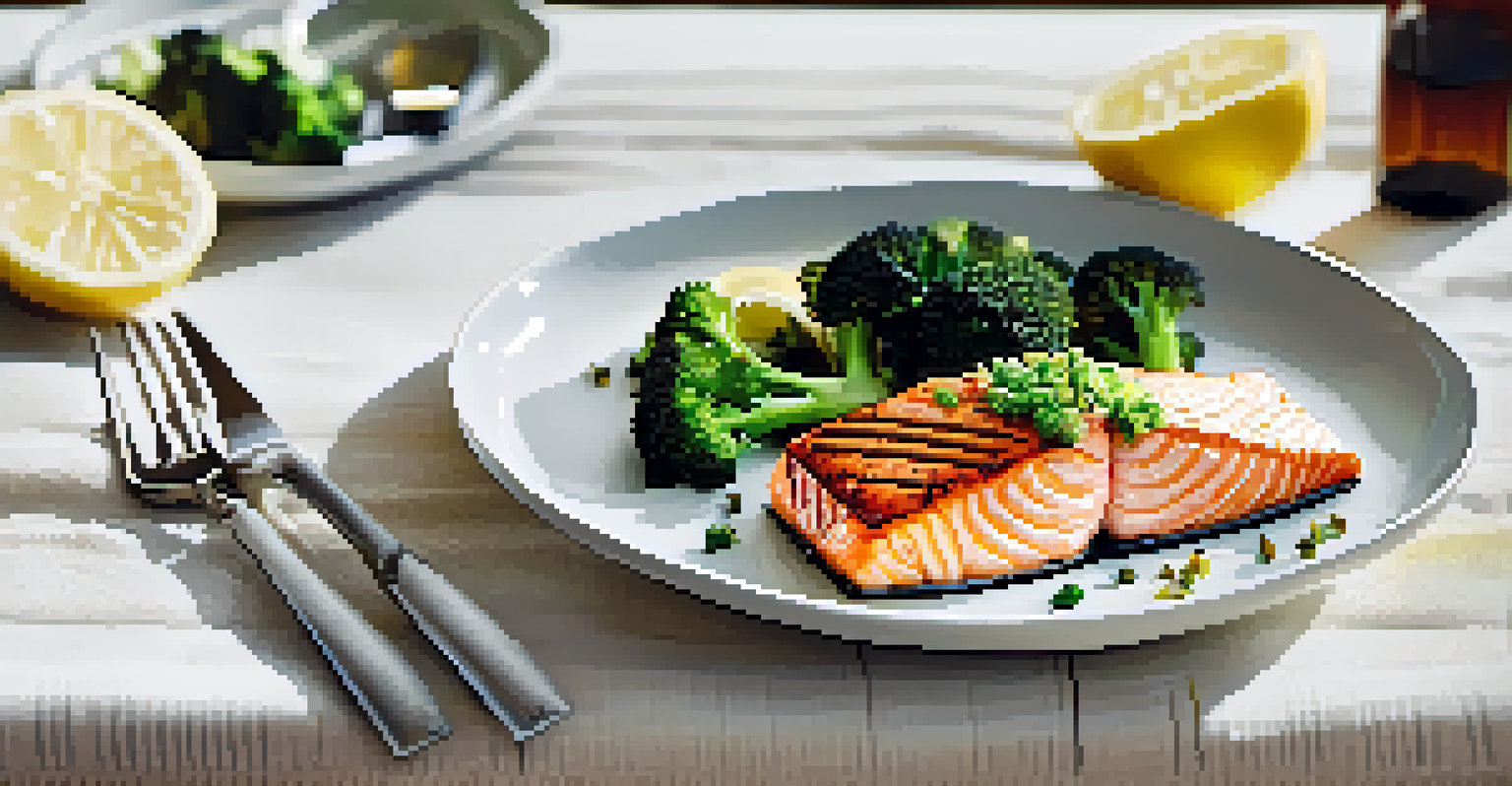High Protein Diets: Do They Preserve Muscle During Weight Loss?

Understanding High Protein Diets and Their Benefits
High protein diets have gained popularity in recent years, especially among those looking to lose weight while preserving muscle mass. These diets typically involve increasing protein intake, often from sources like lean meats, fish, beans, and dairy. The main idea is that protein helps keep you feeling full, which can reduce overall calorie consumption.
Protein is the building block of life, and it plays a vital role in maintaining our health and well-being.
Moreover, protein plays a crucial role in muscle repair and growth. When you're in a calorie deficit for weight loss, your body can break down muscle for energy. By consuming more protein, you can help mitigate this loss and support muscle preservation during your weight loss journey.
It's like trying to hold onto a balloon while losing air; the more you can reinforce the balloon's structure (muscle) with protein, the less likely it is to deflate (shrink). This makes high protein diets a go-to choice for fitness enthusiasts and dieters alike.
The Science Behind Muscle Preservation
Studies have shown that higher protein intake can positively impact muscle preservation during weight loss. Research indicates that individuals consuming diets higher in protein tend to retain more lean muscle mass than those on lower protein diets. This is largely because protein provides the essential amino acids needed for muscle repair and regeneration.

In fact, a common recommendation is to consume about 1.6 to 2.2 grams of protein per kilogram of body weight when trying to lose weight. This amount can help stimulate muscle protein synthesis, which is vital for maintaining muscle during periods of caloric restriction.
High Protein Aids Weight Loss
Increasing protein intake supports weight loss by helping to preserve muscle mass and boost metabolism.
Think of it like a construction project: protein is the building material needed to keep the structure (muscles) intact, even as you’re removing some of the elements (fat) to achieve your desired look.
How High Protein Diets Aid in Weight Loss
High protein diets may not only help preserve muscle but also promote weight loss effectively. Protein has a high thermic effect, meaning your body burns more calories digesting and metabolizing protein compared to fats or carbohydrates. This can give your metabolism a little boost, making weight loss a bit easier.
A diet rich in protein helps to preserve lean muscle mass, especially during weight loss.
Additionally, protein-rich foods often require more energy to digest, leading to greater calorie expenditure. When you're in a calorie deficit, every little bit helps, and a high protein diet can be a strategic tool in your weight loss arsenal.
Imagine your body as a car engine; the right fuel (protein) can rev it up to run more efficiently, even while you're shedding weight.
Incorporating Protein into Your Diet
If you're considering a high protein diet, incorporating protein into your meals is easier than it sounds. Start by including sources like chicken, fish, eggs, lentils, and Greek yogurt in your daily meals. Even snacks can be protein-packed with options like nuts or protein bars.
Planning your meals around protein can also help ensure you're meeting your daily intake goals. For instance, aim for a protein source in every meal and snack, making it a consistent part of your diet rather than an afterthought.
Protein is Key for Muscle Repair
Protein provides essential amino acids necessary for muscle repair and regeneration, especially during calorie deficits.
Think of it as building a balanced plate; just as you wouldn’t forget the foundation when constructing a house, don’t overlook protein when planning your meals.
Potential Risks of High Protein Diets
While high protein diets can offer many benefits, there are potential risks to consider. Some individuals may experience digestive issues, such as constipation or bloating, especially if protein sources are high in fat or low in fiber. It's important to ensure you're still getting plenty of fruits, vegetables, and whole grains.
Additionally, relying too heavily on protein can lead to nutrient imbalances if other food groups are neglected. A well-rounded diet is essential for overall health, so it's crucial to strike a balance between protein and other nutrients.
Think of it as a balanced meal; just as a cake needs flour, eggs, and sugar in the right proportions, your diet needs a variety of foods to be truly nourishing.
Consulting Professionals for Personalized Guidance
Before diving into a high protein diet, it's wise to consult with a healthcare professional or registered dietitian. They can provide personalized recommendations based on your individual health needs, lifestyle, and goals. This is especially important if you have any pre-existing health conditions or dietary restrictions.
A professional can help you design a plan that not only focuses on protein intake but also addresses other crucial aspects of nutrition. This can ensure you're not just losing weight but doing so in a healthy, sustainable way.
Balance is Crucial in Diets
While high protein diets are beneficial, it's important to maintain a balanced intake of other nutrients for overall health.
Think of it as having a coach in your corner; they can guide you to make the best choices for your unique journey.
The Bottom Line on High Protein Diets and Muscle Preservation
In conclusion, high protein diets can be beneficial for preserving muscle mass during weight loss. By providing the necessary building blocks for muscle repair and supporting satiety, these diets can help you achieve your weight loss goals without sacrificing your hard-earned muscle.
However, it's essential to approach any diet with balance and mindfulness. Incorporating a variety of foods and consulting with professionals can ensure that your approach is not only effective but also enjoyable.

Ultimately, think of high protein diets as a tool in your weight loss toolkit; when used wisely, they can help you build a stronger, healthier you.